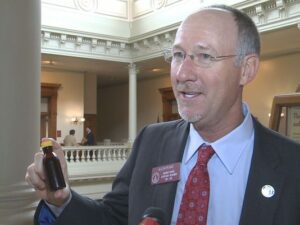
Imagine your child is sick. Now imagine the best hope for your child is a drug that’s illegal in the state where you live. What would you do? That’s the dilemma Sarabeth and Brian Fowler of Clarkesville are facing. Their 8-year old daughter Ava has brain dysplasia, a condition that causes epileptic seizures. She’s on her seventh medication to control the seizures and it’s not working. The hold-out hope for Ava is cannabis oil, a derivative of marijuana. It’s illegal in Georgia.
It came from out of nowhere
Ava was 3 when she was diagnosed. Up until then her mom says her development was normal. Then one day her parents noticed something was wrong. “We started noticing that her lip would quiver and then it became the side of her face, then the side of her body. She would drool,” Sarabeth says. The couple – who lived in Charlotte, North Carolina at the time – took their daughter to a doctor who diagnosed Ava’s condition. “Parts of the cells in her brain didn’t form together correctly.”

The diagnosis took the Fowlers by surprise. Ava had not exhibited any symptoms prior to age 3. “I had a normal pregnancy…she was born on her due date…everything was normal.” Ava’s condition worsened after she was diagnosed and began taking anti-seizure medication. “She was extremely bright and way ahead of the ballgame on learning things up until that point,” Fowler recalls with a hint of lingering sadness. “I had to mourn the loss of a child I had for three years because she was not her anymore.”
Several years ago the family spent two weeks with Ava at Duke University Hospital in Durham, North Carolina, where she was tested to determine if she’s a candidate for brain surgery. Fowler says the tests revealed Ava’s seizures are coming from too many different parts of her brain to make surgery a viable option. She recounts what the doctors told them. “They said, ‘Yeah, we can take out part of her brain that’s causing some of the seizures but that part of her brain also controls motor functions so she couldn’t walk anymore. We could take out a different part but…,’ Fowler interjects, “You can’t go taking out all the sections of her brain because then she wouldn’t be here.”
The Fowlers moved home to Georgia earlier this year to be close to family. Ava is enrolled in special education at Clarkesville Elementary School.
Anti-seizure medication was Ava’s best option at the time but even that has proven risky and, for the most part, ineffective. “Some had extreme side effects. Some wouldn’t work at all,” Fowler says. Ava now takes daily doses of Zonisamide. The drug is controlling her physical convulsions but it’s not stopping her seizures.

“We had an EEG done in Atlanta and I was sitting there with Ava for an hour and I never saw anything. The doctor called me and said she was having seizures the entire time we were there.” Fowler illustrates what Ava’s experiencing. “Can you imagine me sitting here talking to you and your brain is constantly checking in and out? You only hear every other word that I say so you have to try to piece it together.” She describes Ava’s seizures as a jack hammer at work on her brain.
Fowler not only worries about Ava’s seizures, she worries about the side effects of her medication.
Zonisamide’s list of possible side effects include lack of appetite, shakiness and fatigue. Extreme side effects include agitation, bruising, delusions and hallucinations.

Ava also takes Clonazepam in emergency situations such as when she has a seizure at school. Her mom says when she takes it she gets ‘high.’
During extreme seizures the Fowlers have had to administer liquid valium to their daughter.
It’s a cruel irony that the drugs meant to help Ava also put her at risk. That’s why her mom has continued to seek alternative treatments and how she first learned of the potential benefits of cannabis oil.
Cannabis oil is being used in other states to successfully treat epilepsy.
In Colorado where marijuana is now legal cannabis oil is showing great promise as a treatment for epilepsy. “The kids who have received it in Colorado have an 85% reduction in their seizures,” Fowler says excitedly. “That’s pretty huge. Every single person that I have talked to, it has worked for them.”
Medical marijuana is now legal in 23 states. Cannabis oil is legal in 11 states.
Cannabis oil is made from chemical compounds found in marijuana. It contains high levels of CBD – an antioxidant – and low levels of the mind-altering compound THC. Cannabis oil is administered in liquid or pill form and is not considered addictive.

The push is on to legalize cannabis oil here in Georgia. State Representative Allan Peake (R-Macon) introduced a bill earlier this year that would have made it legal for parents like the Fowlers to use it to treat their children. Last minute political wrangling on the last day of the legislative session killed the bill.
Peake has introduced a revised version of the bill for consideration next year. It was the first bill placed in the hopper. He says he expects lawmakers to move on it early in the legislative session which begins on January 12, 2015.
Fighting for Ava and other kids like her
Sarabeth Fowler has joined a league of parents lobbying to get Peake’s bill passed. For them it’s not political…it’s personal.
In a recent press release Peake noted that since the last bill’s failure on March 20, 2014, at least fifteen Georgia families have moved to Colorado for treatment. Three children who lobbied with their parents for the bill’s passage have died.
“I’m an extreme rule follower,” Fowler says. She insists she doesn’t want to break the law or move to Colorado, she just wants to help her daughter. That’s why she’s fighting for Ava under the Gold Dome.

Fowler recently attended a public hearing on Peake’s bill – HB 1 – and invited 9th District State Representative Terry Rogers to her home just before Thanksgiving to find out where he stands on the issue. Rogers says he fully supports the idea of helping children like Ava. He voted for Peake’s bill the last time and says if the new bill is similar he’ll vote for it again. “I find it extremely ironic that the drug that has been prescribed for Ava has the effect of making her ‘high’ while the drug that will not make her ‘high’ is illegal and can’t be prescribed for her,” Rogers says.

During her conversation with Rogers Fowler lays down multiple pages listing the side effects of the drugs that her daughter is taking. She lays down another page beside them listing the side effects of cannabis oil. The page is empty.
Some health professionals and law enforcement officials still aren’t convinced. Director of the Georgia Drugs and Narcotics Agency Rick Allen testified against Peake’s bill during the public hearing in Atlanta on December 3. He told the joint committee he and some federal officials have reservations about the use of medical marijuana in any form because studies haven’t been conducted to verify claims that it helps.
 Despite the lack of scientific evidence Rogers says the personal stories he’s heard and the results that are being reported lead him to conclude cannabis oil should be allowed as a treatment option in Georgia. “Based on what we’ve seen in the states where it’s been legalized I’m perfectly comfortable doing the program under very strict restrictions.” He says fear of the unknown shouldn’t prevent lawmakers from acting. “There’s always a chance side effects will show up but based on what I’ve seen there is not as much uncertainty about cannabis oil as there is certainty of the side effects from other drugs that these children are having to take.”
Despite the lack of scientific evidence Rogers says the personal stories he’s heard and the results that are being reported lead him to conclude cannabis oil should be allowed as a treatment option in Georgia. “Based on what we’ve seen in the states where it’s been legalized I’m perfectly comfortable doing the program under very strict restrictions.” He says fear of the unknown shouldn’t prevent lawmakers from acting. “There’s always a chance side effects will show up but based on what I’ve seen there is not as much uncertainty about cannabis oil as there is certainty of the side effects from other drugs that these children are having to take.”
Fowler knows all too well about fear and uncertainty, she’s lived with them for five years. She knows what’s at stake. She sees it each time she looks into her daughter’s eyes. In Ava she sees the daughter that was, the daughter that is and the daughter that could be. She loves all of them.
 Her smiling, blond, bright blue-eyed girl bounces into the room near the end of our interview to show off her latest artwork. It’s an Indian made out of tissue paper and a toilet paper roll. She names him “Mr. Terry.” Before Rogers leaves he gives Ava a big hug. He hugs her mom, too, and promises to help any way that he can. It’s a promise that fuels Sarabeth Fowler’s hope; hope that there are other lawmakers like Rogers and Peake who’ll carry on her fight for Ava under the Gold Dome come January.
Her smiling, blond, bright blue-eyed girl bounces into the room near the end of our interview to show off her latest artwork. It’s an Indian made out of tissue paper and a toilet paper roll. She names him “Mr. Terry.” Before Rogers leaves he gives Ava a big hug. He hugs her mom, too, and promises to help any way that he can. It’s a promise that fuels Sarabeth Fowler’s hope; hope that there are other lawmakers like Rogers and Peake who’ll carry on her fight for Ava under the Gold Dome come January.







